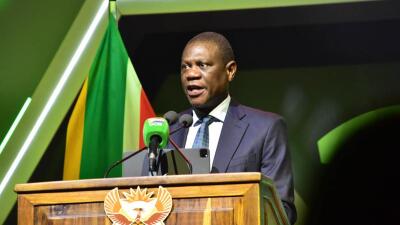Under the theme ‘Let Communities Lead,’ Deputy President Mashatile urged for increased efforts to tackle inequalities and highlighted the interconnection between HIV spread and gender-based violence.
Addressing the World Aids Day commemoration in KwaZulu-Natal, Deputy President Paul Mashatile emphasised the crucial role of community-driven initiatives in the fight against HIV/Aids.
During the official commemoration of
The theme of this year’s event, “Let Communities Lead,” resonated with the deputy president’s call for stronger solidarity and a unified purpose.
Mashatile highlighted the vital role of communities in addressing inequalities that exacerbate the HIV epidemic, stressing the need for interventions focused on vulnerable groups such as women, transgender persons, sex workers, and persons with disabilities.
“History demonstrates that when communities unite, any challenge can be overcome,” he said.
Mashatile directly linked the surge of gender-based violence and femicide to the spread of HIV, urging a collaborative approach to eradicate these scourges.
He praised the Takuwani Riime Men’s Movement, coordinated by the Sanac Men’s Sector, for its commitment to establishing community men’s parliaments and mobilising men and boys in the fight against gender-based violence, new HIV infections, and toxic masculinity.
Mashatile also reflected on the findings of the sixth South African National HIV Prevalence, Incidence, and Behavioural Survey by the Human Sciences Research Council.
The survey shows a decrease in HIV prevalence from 14% in 2017 to 12.7% in 2022, but raises concerns about increased HIV incidence among adolescent girls and the high prevalence among certain age groups.
Despite these challenges, the deputy president remains optimistic about meeting the 95-95-95 UNaids targets by 2025 and achieving the goal of ending Aids by 2030.
In December 2020, UNaids released a new set of ambitious targets calling for 95% of all people living with HIV to know their HIV status, 95% of all people with diagnosed HIV infection to receive sustained antiretroviral therapy, and 95% of all people receiving antiretroviral therapy to have viral suppression by 2025.
Mashatile cited the recent launch of the National Strategic Plan for 2023–2028 and the successful implementation of the “TLD” HIV treatment regimen as key steps towards these goals.
Furthermore, Mashatile announced the launch of the South African Chapter of the Global Alliance to End Aids in Children by 2030.
He highlighted the low treatment coverage for children living with HIV in South Africa and outlined strategies to improve care and treatment access for this vulnerable group.
“We are concerned with HIV treatment gaps in children. Children living with HIV aged 15 years and below are left behind in the global HIV response when compared to the general population,” Mashatile said.
“Globally, only 52% of children who are living with HIV are on lifesaving treatment, compared to 76% of the adult population. This has resulted in children accounting for 15% of Aids-related deaths on an annual basis, despite the fact that only 4% of the total number of people living with HIV are children,” he said.
In his speech, Mashatile called for a unified effort to ensure universal access to HIV treatment, eliminate mother-to-child transmission, and confront the stigma and discrimination that still prevail.
“Together, we have the power to end the epidemic of HIV and Aids,” he added, noting the collective responsibility in this critical health battle.
IOL News

